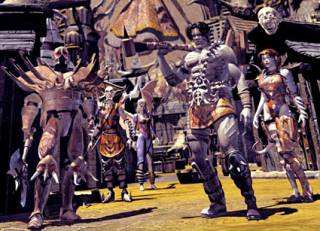I play old games (Planescape Torment)
By ArbitraryWater 26 Comments

And the reason why both those things are true is simply this: Planescape is the anti-RPG. I don't mean anti to imply "the polar opposite of", but more like " of the same kind but situated opposite, exerting energy in the opposite direction, or pursuing an opposite policy", as the Merriam Webster dictionary would put it. And indeed, I imagine at any point of the game where the developers could have inserted something that could be related to contemporary fantasy, or inserted something weird, they chose to insert something weird. It's a world where there are only two swords the player can posess, no elves, dwarves or other similar cliche fantasy races, and also a world where the color green is rarely used for just about anything (instead? A lot of brown). The game goes far enough with this to even include an optional dungeon that quite hilariously mocks established fantasy conventions and the purposelessness of most dungeoneering. It's perhaps this alone that gives Planescape such a unique identity, and although there's certainly more to it than just being totally off-kilter, it's this opposite day mentality that permeates a lot of the game's design. It's this that also makes it much harder to relate to the world of Planescape, as everything has to be explained and established through lengthy sections of text (thankfully, I was at least partially aware of some of the weirdness through my exposure to the Dungeon Master's Guide in days of yore).

Of course, the other best part about Planescape is the dialog. It's dense, nay, verbose and there is easily a novel's worth of text in this thing. It's all extremely well written too. Not much of it is voice acted, but what is is delivered well enough. What Planescape did really well for me was make me actually consider dialog options. This is a rare feat. At some point in games like Mass Effect, one tends to autopilot their binary moral choices after a while. While the actual consequences of any one dialog choice is negligible (at least they aren't pretending it is), the inclusion of such things as player intent ("Truth: I agree" or "Lie: I agree") goes a long way in making you at least feel like your character is capable of decent roleplaying and not just a good/evil switch. The bad side of all of this is that the dialog is usually the reward for some sort of fetch quest. Because there's actually not a whole ton of combat in the game, a lot of what you're doing is almost adventure game-like in the way you have to talk to someone, then talk to someone else, or find an item and talk to someone. The parts where you fight are pretty boring actually and it's great that you can talk yourself to victory, much like Fallout.

Thus, as previously said, the bad parts about Planescape are the parts that would otherwise be good in any other RPG. Since a lot of the core gameplay revolves around fetch quests, the actual combat parts are somewhat undercooked. There's not a ton of strategy to be had, nor is there an especially large variety of combat roles to fill. This is partially because The Nameless One can only be a Fighter, a Thief, or a Mage. Having played through as a mage, I will tell you right now that the correct answer is probably fighter. Unless you're really into the way you have to backstab in 2nd ed AD&D, there's no reason to be a thief (see Imoen's Law: In any game where you would need someone to unlock doors and disarm traps, one is already provided for you. SO DON'T MAKE YOUR MAIN GUY A THIEF), and the combat is shallow enough that Dak'kon or Ignus can probably cover your magic need. Since most of your party members already have their own signature weapons, most of the stuff you find is intended for you and only fighters can use the really good stuff (i.e. Hammers and Axes). The corollary of this is of course that since the dump stats are so useful to put points into (wisdom in particular, as it gives you a million billion dialog options as well as a substantial boost to your XP gain), you may find yourself gimped in the strength department, at least in the beginning. It's good that the less desirable parts of planescape are less frequent, but at some point the D&D license and ruleset feels ancillary to the entire experience.
Planescape is a very weird game. By being basically the polar opposite of something like Icewind Dale, the fact that there are regular RPG parts to it seems almost pointless, as if the game would be better without the combat or statistics (answer: Maybe not entirely). It's also a game based around fetch quests and reading a lot of well written, if verbose, dialog. At the end of the day, it's an unique game in the RPG pantheon and one very much worth playing. Assuming you like reading and/or occasionally using a guide. Which I like both. So I'm good. Hey, this game is pretty awesome, isn't it? Almost forgot that part. Don't think that I'm down on this.
